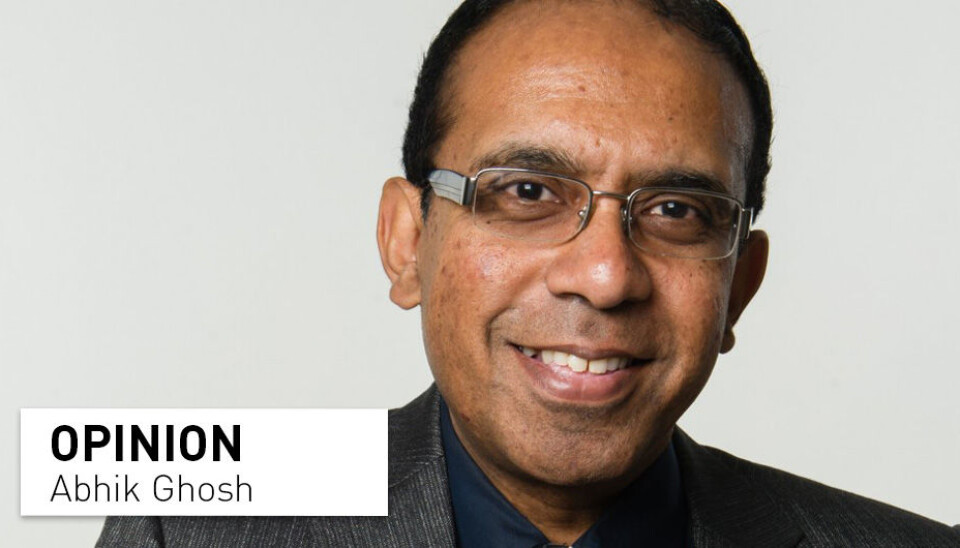Opinion:

On academia and diversity: It wasn’t overt racism, but I have been sidelined.
OPINION: Having spent 25 years as a brown man in Norwegian academia, here are some reflections on diversity and inclusion in Norwegian science.
Even a few months ago, I could not have imagined writing this article.
I always prided myself on being energetic, doing the best I can under the circumstances, getting science done and publishing papers, and advising students and postdocs to do the same. I despised “identity politics” as much as anyone else and had faith that, in a meritocratic system, the cream would always rise to the top.
In my heart of hearts, I as a brown person of Indian origin of course knew better.
George Floyd’s death at the hands of Minneapolis police and the subsequent world-wide protests shook me out of my complacency.
Soon after, on 4 June 2020, a grotesque opinion piece appeared on the website of Angewandte Chemie, one of chemistry’s oldest and most respected journals, describing current attempts to diversify academia as a negative development. As the ensuing shock subsided, the scientific community has engaged in a great deal of self-examination at how a respected and senior academic could still harbor such regressive views. Although such views are probably quite rare in Norwegian academia, there is still a need to focus on issues of diversity and equality, as I wrote with a colleague in an opinion piece in the newspaper Khrono.
Unsurprisingly under the circumstances, a number of foreign colleagues have asked me whether I have experienced racism in my 25 years as a faculty member in Norway. The answer is that I have not experienced overt racism in Norway.
My own experience
I would describe myself as reasonably well-integrated and successful in the Norwegian system. With a moderate flow of grants from the Research Council of Norway, I have been able to maintain a good flow of scientific publications. I have also enjoyed the camaraderie of a wonderful, self-motivated research group, whom I have been only too happy not to micromanage.
Yet it has been a dispiriting journey. A small selection of incidents will illustrate why.
With a few notable exceptions, I would describe my superiors as indifferent, and a small handful even hostile, to my scientific ambitions. Solemn commitments to build up my specialty area – inorganic chemistry, one of chemistry’s major subdisciplines – were promptly forgotten, while more influential individuals and groups were allowed to build their own areas with abandon.
On multiple occasions, I have had colleagues and superiors suggest to me that I should not apply for a regionally or nationally advertised grant so as not to create “undue competition” for another ethnic-Norwegian or European colleague.
I have also had little say in policy- and decision-making at any level. Expressions of interest to serve on leadership teams, for which I considered myself well qualified, have generally been brushed aside.
Likewise, never in my 25 years of serving as a faculty member in Norway, have I been asked to serve on, let alone chair, a selection committee for new faculty members. And this in spite of having an unusually wide circle of scientific friends and collaborators, who could have helped us recruit some top-notch chemists.
Many non-Western employees of color have confided in me that they are employed at slightly lower pay grades relative to their European counterparts with similar qualifications.
Finally, I have witnessed highly accomplished black and brown collaborators shabbily treated – in my view – and let go, when funding ran out, while less qualified European researchers in similar positions were enthusiastically appointed to permanent positions.
In sum, although I have not experienced overt racism, I would describe my overall experience at UiT as one of being sidelined.
Norway’s citizens increasingly multicultural
Why should my experiences, clearly of importance to me, be of broader concern? Rooting out bias and discrimination is of course the right thing to do. But there are more pragmatic reasons as well. Let me name a few.
One reason that’s widely recognized is that Norway’s citizenry is increasingly multicultural. Today, almost a fifth of Norway’s population (18 per cent) consists of first- and second-generation immigrants. As outlined in a recent article by Midtbøen and Nadim the degree to which young, second-generation immigrants participate in higher education varies greatly across different immigrant groups.
Clearly, it is of some importance that higher education occurs in a more inclusive manner and avoids what the authors call “ethnic niche formation at the top”, i.e. concentration of certain ethnicities in high-prestige positions.
Norwegian science depends on foreign labour
An equally important point, but one that’s much less appreciated by the public, is that Norwegian science is critically dependent on imported foreign labour. An examination of Google Scholar suggests that fully a third of Norway’s most cited authors are of foreign origin, including a good sprinkling of non-Western scholars. Hardly any of the latter, however, are in any form of leadership position or for that matter a member of any of Norway’s national academies including The Norwegian Academy of Science and Letters and Norwegian Academy of Technological Sciences.
In my own case, given that the per-capita scientific output of my research group has been roughly an order of magnitude higher than the average at my unit, my superiors’ indifference to my scientific ambitions has almost certainly come at a substantial cost to the University of Tromsø. Thus, UiT may have missed the boat on a national Center of Excellence or for that matter an ERC grant based on my area of research, both tremendous losses for any European university.
Finally, scholars of colour are far from the only sufferers of shabby treatment; there are plenty of ethnic Norwegians and Europeans who experience the same. All too often there are insiders and outsiders in the system and a cliquish leadership promotes the former, while letting the latter die on the vine.
The way forward
With its excellent administrative structures, Norway is in a strong position to tackle the types of problems outlined above.
Already in 2016, a study from the then Oslo and Akershus University College of applied Sciences, now OsloMet, concluded that we ought to move our focus from recruitment to inclusion, especially with regard to creating more diverse leadership teams.
The following are a few, somewhat personal suggestions:
(1) Include foreign staff in committee work. Take advantage of their diverse experiences and viewpoints. When recruiting staff internationally, use existing foreign staff’s international contacts to identify top global talent.
(2) Substantial amounts of research funding are now administered through Universities, including PhD studentships, postdoctoral positions, and strategic funds. Ensure these resources are properly administered, with oversight at multiple levels so lower-level administrators do not simply award them to their protégés.
(3) Ensure foreigners are compensated and promoted commensurate with their achievements. Ensure that the University’s awards and honors go to the most deserving. Few things are more corrosive to a system than awards and honors going to undeserving candidates.
(4) Develop efficient mechanisms for handling complaints and concerns related to discrimination, both specific incidents and systemic concerns.
(5) World-class talent is a rare commodity. Ensure that universities can retain such talent and protect them from temporary lack of funding.
My negative experiences notwithstanding, Tromsø and UiT continue to be home. Deep friendships and relationships bind me to this Arctic city. I am also greatly appreciative of the enlightened top leadership at UiT and other Norwegian universities. What’s needed is some improvement at the level of middle management – admittedly easier said than done.
Share your science or have an opinion in the Researchers' zone
The ScienceNorway Researchers' zone consists of opinions, blogs and popular science pieces written by researchers and scientists from or based in Norway. Want to contribute? Send us an email!







